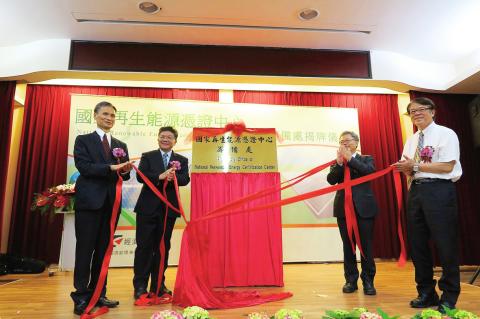The Ministry of Economic Affairs yesterday established the National Renewable Energy Certificate center as part of efforts to attract foreign enterprises that pledge to use “renewable” energy when investing or placing orders with local manufacturers.
“Google and some foreign companies used to raise doubts over the ‘purity’ of the renewable energy supply here. Certificates issued by the center could ease such concerns,” Minister of Economic Affairs Lee Chih-kung (李世光) said, adding that both Google and Apple Inc have welcomed the center.
The Taipei-based center is to issue its first renewable energy certificate (REC) before the end of June at the earliest, according to the Bureau of Standards, Metrology and Inspection.

Photo courtesy of the Ministry of Economic Affairs
‘GREEN’ TAGS
RECs, also known as “green” tags, provide proof that an enterprise’s electricity was generated from an eligible renewable energy source. The US, EU, Japan and Australia also have institutions to issue RECs.
Certifiable renewable energy sources include solar, wind, biomass, hydroelectric and geothermal power, bureau Director-General Liu Ming-chung (劉明忠) said.
The center will verify the power generation process and investigate a company’s actual “green” power usage, Liu said.
In addition, the center could serve as a matchmaking platform to help enterprises seek power companies to buy “green” energy and obtain RECs.
CLOSELY MONITORED
Some international companies, such as Google, have closely monitored the ministry’s process to establish the center as they have investments in Taiwan, a source at the bureau told the Taipei Times on condition of anonymity.
The source said that after Apple on Thursday released its environmental report saying that three more of its suppliers have pledged to power their production lines only with renewable energy sources by the end of next year, the bureau received “countless” calls from local firms in the Apple supply chain asking about the process of applying for RECs.
The bureau is to host a conference for enterprises and power companies on Friday next week to explain the REC application process in detail, the source said.

SEMICONDUCTORS: The German laser and plasma generator company will expand its local services as its specialized offerings support Taiwan’s semiconductor industries Trumpf SE + Co KG, a global leader in supplying laser technology and plasma generators used in chip production, is expanding its investments in Taiwan in an effort to deeply integrate into the global semiconductor supply chain in the pursuit of growth. The company, headquartered in Ditzingen, Germany, has invested significantly in a newly inaugurated regional technical center for plasma generators in Taoyuan, its latest expansion in Taiwan after being engaged in various industries for more than 25 years. The center, the first of its kind Trumpf built outside Germany, aims to serve customers from Taiwan, Japan, Southeast Asia and South Korea,

POWERING UP: PSUs for AI servers made up about 50% of Delta’s total server PSU revenue during the first three quarters of last year, the company said Power supply and electronic components maker Delta Electronics Inc (台達電) reported record-high revenue of NT$161.61 billion (US$5.11 billion) for last quarter and said it remains positive about this quarter. Last quarter’s figure was up 7.6 percent from the previous quarter and 41.51 percent higher than a year earlier, and largely in line with Yuanta Securities Investment Consulting Co’s (元大投顧) forecast of NT$160 billion. Delta’s annual revenue last year rose 31.76 percent year-on-year to NT$554.89 billion, also a record high for the company. Its strong performance reflected continued demand for high-performance power solutions and advanced liquid-cooling products used in artificial intelligence (AI) data centers,

Gasoline and diesel prices at domestic fuel stations are to fall NT$0.2 per liter this week, down for a second consecutive week, CPC Corp, Taiwan (台灣中油) and Formosa Petrochemical Corp (台塑石化) announced yesterday. Effective today, gasoline prices at CPC and Formosa stations are to drop to NT$26.4, NT$27.9 and NT$29.9 per liter for 92, 95 and 98-octane unleaded gasoline respectively, the companies said in separate statements. The price of premium diesel is to fall to NT$24.8 per liter at CPC stations and NT$24.6 at Formosa pumps, they said. The price adjustments came even as international crude oil prices rose last week, as traders

SIZE MATTERS: TSMC started phasing out 8-inch wafer production last year, while Samsung is more aggressively retiring 8-inch capacity, TrendForce said Chipmakers are expected to raise prices of 8-inch wafers by up to 20 percent this year on concern over supply constraints as major contract chipmakers Taiwan Semiconductor Manufacturing Co (TSMC, 台積電) and Samsung Electronics Co gradually retire less advanced wafer capacity, TrendForce Corp (集邦科技) said yesterday. It is the first significant across-the-board price hike since a global semiconductor correction in 2023, the Taipei-based market researcher said in a report. Global 8-inch wafer capacity slid 0.3 percent year-on-year last year, although 8-inch wafer prices still hovered at relatively stable levels throughout the year, TrendForce said. The downward trend is expected to continue this year,